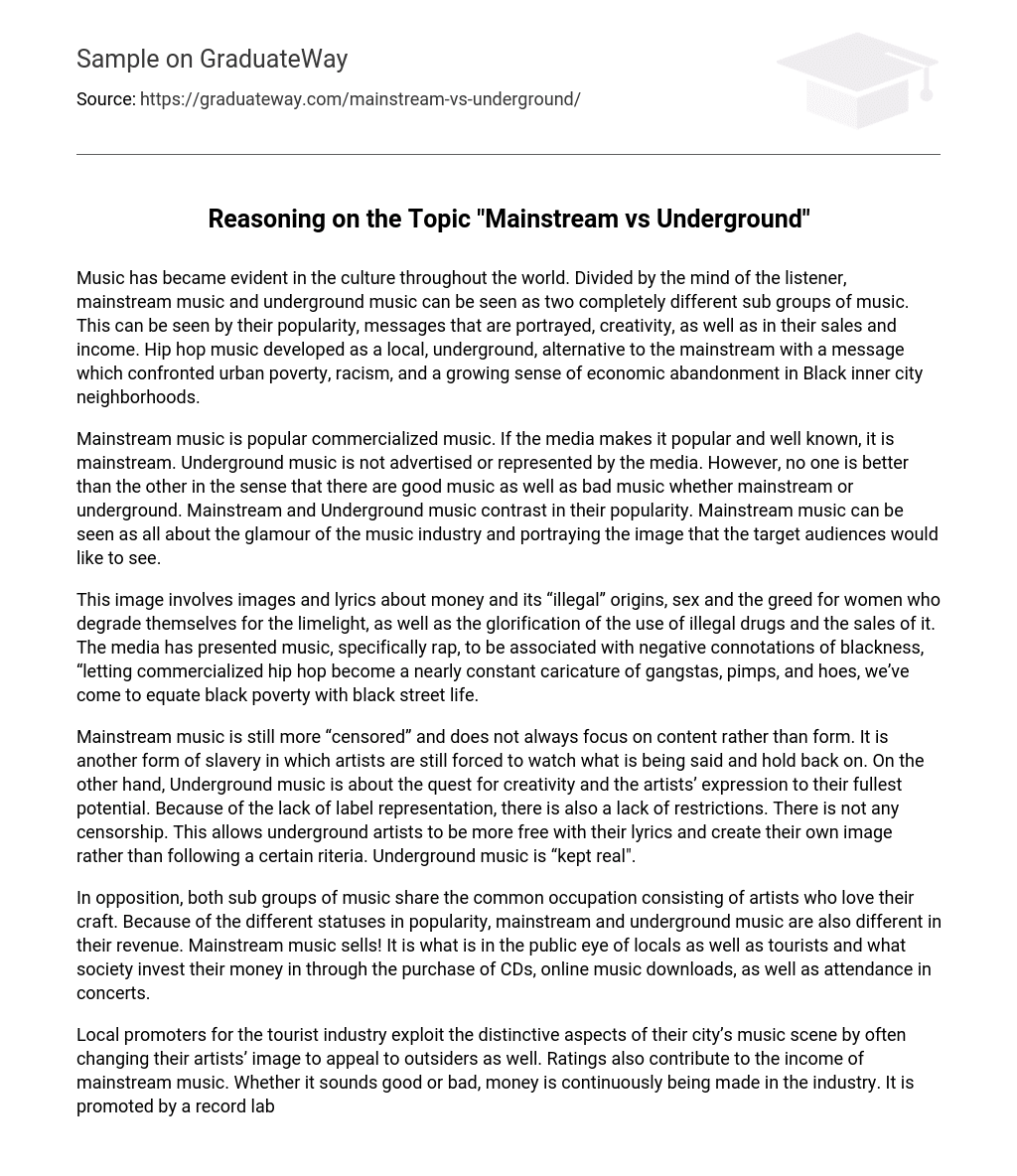Music is a global expression found in diverse cultures, encompassing mainstream and underground genres that cater to different audiences. These subcategories differ in terms of popularity, conveyed themes, artistic innovation, and financial achievements. Hip hop, initially an alternative underground movement, challenged societal challenges such as urban impoverishment, racism, and economic marginalization faced by Black communities residing in inner cities.
Mainstream music, widely known and promoted by the media, refers to popular commercialized music. It is praised for its popularity and commercial success. In contrast, underground music, not represented or advertised by the media, exists as an alternative. However, it is crucial to acknowledge that both mainstream and underground music can possess positive and negative attributes. The fundamental difference lies in their level of popularity. Mainstream music frequently emphasizes glamour and projecting a desired image for its intended audience.
The media has depicted rap music, particularly when connected to black culture, as being associated with negative stereotypes. Such stereotypes include the correlation between wealth and its unlawful origins, the exploitation of women for fame, and the glorification of illegal drug usage and sales. This further perpetuates the misconception that poverty within the black community is equivalent to a life filled with criminality and promiscuity.
Mainstream music emphasizes form over content and imposes restrictions on artists, akin to a modern form of slavery. In contrast, underground music embraces creativity and the full expression of artists. Without label representation, underground artists are not bound by censorship or conformity. This freedom enables them to convey their lyrics more freely and establish their unique identity, rather than adhering to a predetermined criteria. Underground music prioritizes authenticity.
Both mainstream and underground music genres have artists who are passionate about their craft. However, their popularity levels result in different revenues. Mainstream music, which is highly visible among locals and tourists, captures society’s attention and generates income through CD sales, online music downloads, and concert attendance.
Both local promoters and the tourist industry take advantage of the unique characteristics of their city’s music scene. This often involves modifying the artists’ image in order to appeal to non-locals. Additionally, ratings play a role in generating income for mainstream music. Regardless of the quality of the music, the industry is constantly driven by monetary gains. Record labels, whose objective is to make a profit, are responsible for promoting and marketing it. However, this is in contrast to underground music, which either has limited sales or none at all, depending on how much effort the artists put into promoting themselves. Underground artists are rarely advertised to the public for purchase or download.
Concerts are frequently organized by underground music artists to gain recognition from fans who appreciate their unpublished music. The way music is presented is heavily impacted by creativity, as it determines its appeal and impact on the listener. In contrast to mainstream music, underground music displays greater originality, with artists creating their own beats and writing their own lyrics.
The ability for artists to release their own music grants them a greater sense of autonomy and promotes more creativity since there are no constraints to adhere to. Graffiti, beat boxing, and beat making may be looked down upon in popular music nowadays. Nevertheless, underground artists utilize these mediums as a way to express themselves and establish connections with others. Underground music holds the potential to influence individuals and act as a platform for both the artist and the audience, possibly sparking transformation. On the other hand, mainstream music is predominantly geared towards commercialization and prioritizes sales through their musical output.
The presentations, sales, creativity, and messages of mainstream and underground music can be noticeably different. However, most underground artists eventually transition into the mainstream industry and adapt to fit the conventions of mainstream music. Given enough time, mainstream artists can also reshape mainstream music to resemble its past roots in underground music, which had a stronger focus on positive influence rather than negative. Despite being overlooked by the press, various scenes can gain recognition and maintain their cultural distinctions through the influence of music press and niche media, as mentioned by Thornton.





